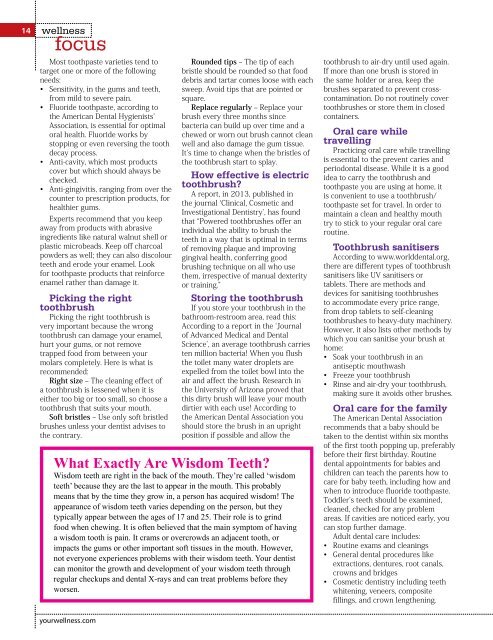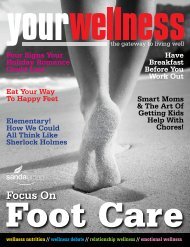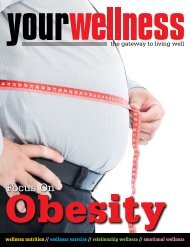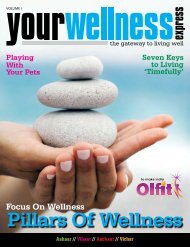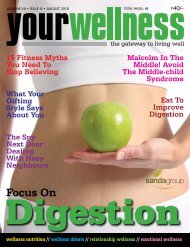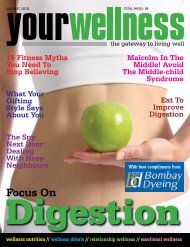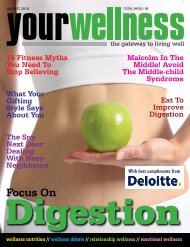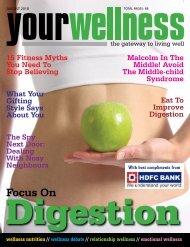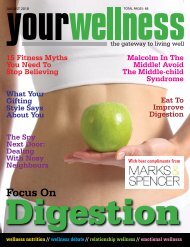Sand_Issue_September-2018
You also want an ePaper? Increase the reach of your titles
YUMPU automatically turns print PDFs into web optimized ePapers that Google loves.
14 wellness<br />
focus<br />
Most toothpaste varieties tend to<br />
target one or more of the following<br />
needs:<br />
• Sensitivity, in the gums and teeth,<br />
from mild to severe pain.<br />
• Fluoride toothpaste, according to<br />
the American Dental Hygienists'<br />
Association, is essential for optimal<br />
oral health. Fluoride works by<br />
stopping or even reversing the tooth<br />
decay process.<br />
• Anti-cavity, which most products<br />
cover but which should always be<br />
checked.<br />
• Anti-gingivitis, ranging from over the<br />
counter to prescription products, for<br />
healthier gums.<br />
Experts recommend that you keep<br />
away from products with abrasive<br />
ingredients like natural walnut shell or<br />
plastic microbeads. Keep off charcoal<br />
powders as well; they can also discolour<br />
teeth and erode your enamel. Look<br />
for toothpaste products that reinforce<br />
enamel rather than damage it.<br />
Picking the right<br />
toothbrush<br />
Picking the right toothbrush is<br />
very important because the wrong<br />
toothbrush can damage your enamel,<br />
hurt your gums, or not remove<br />
trapped food from between your<br />
molars completely. Here is what is<br />
recommended:<br />
Right size – The cleaning effect of<br />
a toothbrush is lessened when it is<br />
either too big or too small, so choose a<br />
toothbrush that suits your mouth.<br />
Soft bristles – Use only soft bristled<br />
brushes unless your dentist advises to<br />
the contrary.<br />
Rounded tips – The tip of each<br />
bristle should be rounded so that food<br />
debris and tartar comes loose with each<br />
sweep. Avoid tips that are pointed or<br />
square.<br />
Replace regularly – Replace your<br />
brush every three months since<br />
bacteria can build up over time and a<br />
chewed or worn out brush cannot clean<br />
well and also damage the gum tissue.<br />
It’s time to change when the bristles of<br />
the toothbrush start to splay.<br />
How effective is electric<br />
toothbrush?<br />
A report, in 2013, published in<br />
the journal ‘Clinical, Cosmetic and<br />
Investigational Dentistry’, has found<br />
that “Powered toothbrushes offer an<br />
individual the ability to brush the<br />
teeth in a way that is optimal in terms<br />
of removing plaque and improving<br />
gingival health, conferring good<br />
brushing technique on all who use<br />
them, irrespective of manual dexterity<br />
or training.”<br />
Storing the toothbrush<br />
If you store your toothbrush in the<br />
bathroom-restroom area, read this:<br />
According to a report in the ‘Journal<br />
of Advanced Medical and Dental<br />
Science’, an average toothbrush carries<br />
ten million bacteria! When you flush<br />
the toilet many water droplets are<br />
expelled from the toilet bowl into the<br />
air and affect the brush. Research in<br />
the University of Arizona proved that<br />
this dirty brush will leave your mouth<br />
dirtier with each use! According to<br />
the American Dental Association you<br />
should store the brush in an upright<br />
position if possible and allow the<br />
What Exactly Are Wisdom Teeth?<br />
Wisdom teeth are right in the back of the mouth. They’re called ‘wisdom<br />
teeth’ because they are the last to appear in the mouth. This probably<br />
means that by the time they grow in, a person has acquired wisdom! The<br />
appearance of wisdom teeth varies depending on the person, but they<br />
typically appear between the ages of 17 and 25. Their role is to grind<br />
food when chewing. It is often believed that the main symptom of having<br />
a wisdom tooth is pain. It crams or overcrowds an adjacent tooth, or<br />
impacts the gums or other important soft tissues in the mouth. However,<br />
not everyone experiences problems with their wisdom teeth. Your dentist<br />
can monitor the growth and development of your wisdom teeth through<br />
regular checkups and dental X-rays and can treat problems before they<br />
worsen.<br />
toothbrush to air-dry until used again.<br />
If more than one brush is stored in<br />
the same holder or area, keep the<br />
brushes separated to prevent crosscontamination.<br />
Do not routinely cover<br />
toothbrushes or store them in closed<br />
containers.<br />
Oral care while<br />
travelling<br />
Practicing oral care while travelling<br />
is essential to the prevent caries and<br />
periodontal disease. While it is a good<br />
idea to carry the toothbrush and<br />
toothpaste you are using at home, it<br />
is convenient to use a toothbrush/<br />
toothpaste set for travel. In order to<br />
maintain a clean and healthy mouth<br />
try to stick to your regular oral care<br />
routine.<br />
Toothbrush sanitisers<br />
According to www.worlddental.org,<br />
there are different types of toothbrush<br />
sanitisers like UV sanitisers or<br />
tablets. There are methods and<br />
devices for sanitising toothbrushes<br />
to accommodate every price range,<br />
from drop tablets to self-cleaning<br />
toothbrushes to heavy-duty machinery.<br />
However, it also lists other methods by<br />
which you can sanitise your brush at<br />
home:<br />
• Soak your toothbrush in an<br />
antiseptic mouthwash<br />
• Freeze your toothbrush<br />
• Rinse and air-dry your toothbrush,<br />
making sure it avoids other brushes.<br />
Oral care for the family<br />
The American Dental Association<br />
recommends that a baby should be<br />
taken to the dentist within six months<br />
of the first tooth popping up, preferably<br />
before their first birthday. Routine<br />
dental appointments for babies and<br />
children can teach the parents how to<br />
care for baby teeth, including how and<br />
when to introduce fluoride toothpaste.<br />
Toddler’s teeth should be examined,<br />
cleaned, checked for any problem<br />
areas. If cavities are noticed early, you<br />
can stop further damage.<br />
Adult dental care includes:<br />
• Routine exams and cleanings<br />
• General dental procedures like<br />
extractions, dentures, root canals,<br />
crowns and bridges<br />
• Cosmetic dentistry including teeth<br />
whitening, veneers, composite<br />
fillings, and crown lengthening.<br />
yourwellness.com


